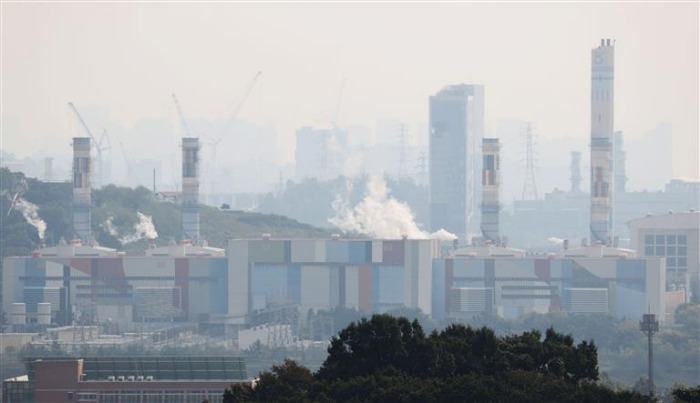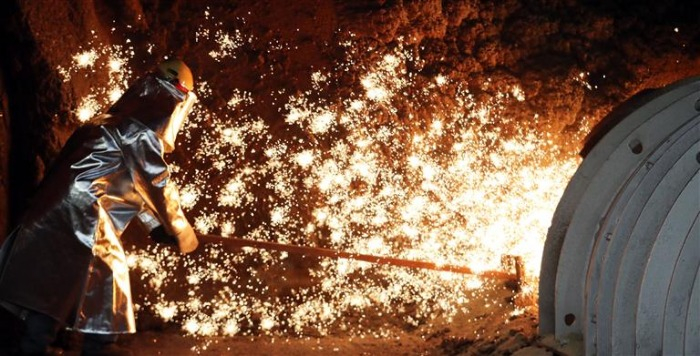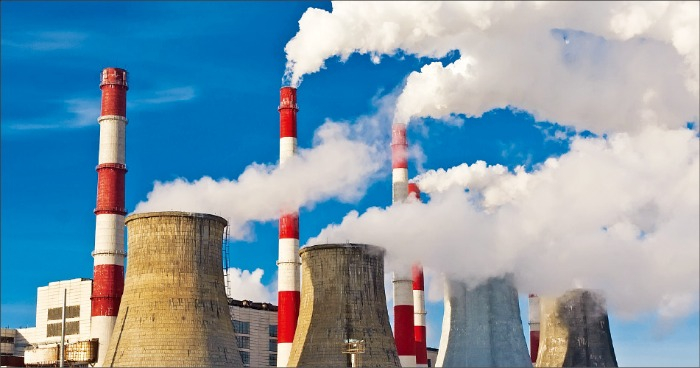Carbon neutrality
Top S.Korean firms face carbon neutrality dilemma
Carbon emissions by South Korea's top 30 companies reached historic highs in 2021 on the back of output growth
By Jul 04, 2022 (Gmt+09:00)
3
Min read
Most Read
LG Chem to sell water filter business to Glenwood PE for $692 million


KT&G eyes overseas M&A after rejecting activist fund's offer


Mirae Asset to be named Korea Post’s core real estate fund operator


StockX in merger talks with Naver’s online reseller Kream


Meritz backs half of ex-manager’s $210 mn hedge fund



South Korea’s top 30 companies emitted their largest-ever amount of carbon dioxide last year, contrary to their goal of reducing greenhouse gas emissions by 4.2% per year by 2030.
A ramp-up in their production to pre-pandemic levels led to the rise in carbon emissions. That makes it much harder for them to achieve the government's carbon neutrality goals.
Otherwise, they may have to spend billions of dollars buying carbon credits annually.
In 2021, carbon emissions by the country’s top 30 firms, excluding state-run companies, increased 4.2% to a combined 260.8 million tons from a year earlier in terms of tCO2-eq, according to the environment ministry and the regulatory Financial Supervisory Service.
The 2021 figure was a record high since South Korea began compiling the relevant data. tCO2-eq is a measure of greenhouse gas emissions.
The top 30 companies, including steelmaker POSCO Co., accounted for 38.4% of South Korea's total carbon dioxide emissions in 2021. The growth in the 30 companies' CO2 emissions was sharper than the average 3.5% rise for South Korea as a whole in the same year.
“Everyone knows the 2030 carbon neutrality goal is unfeasible, but no one dares speak up amid the ESG fever,” a Korean company CEO told The Korea Economic Daily, requesting anonymity.
POSCO ranked South Korea’s top carbon emitter for a second straight year with 78.5 million tons of emissions in 2021.
Hyundai Steel Co. and Samsung Electronics Co. followed with 29.1 million tons and 19.3 million tons. For Samsung, output growth for semiconductor chips drove its CO2 emissions 11.8% higher than a year earlier

4.2% REDUCTION PER YEAR
The goal, set forth by former President Moon Jae-in last November, means a 4.2% annual reduction in carbon emissions. That is more than double the average annual emission reduction of 1.98% set by the European Union countries.
For the time being, Korean manufacturers may need to scale back their factory operations at the expense of dwindling operating profits to meet the emission goals, an industry insider said.
Their plans to develop carbon capture and storage (CCS) technology will drastically cut carbon emissions. But its development costs and technological difficulties will make it unlikely to commercialize the technology by 2030.

Out of the top 30 companies, 22 firms saw a rise in their greenhouse gas emissions last year.
GS EPS Co., an operator of thermal power generation plants, saw the biggest on-year rise of 22.8%.
Companies that emit larger than the government guidance need to buy carbon credits from the Korea Exchange. A carbon credit is a permit that allows the company that holds it to emit a certain amount of carbon dioxide or other greenhouse gases.
But the volatile prices of carbon credits due to their small market size and commodity-based trade are another burden to Korean companies.
Among the biggest emitters, steel, cement and petrochemical companies in South Korea are estimated to spend a minimum of 400 trillion won ($310 billion) by 2050 to go carbon-free.
“South Korean manufacturing companies boast the world's highest production efficiency,” said an official of the state-run Korea Institute for Industrial Economics and Trade.
“They need to upgrade production facilities to comply with the net-zero emission targets, but that will increase their marginal costs.”
Write to Kyung-Min Kang at kkm1026@hankyung.com
Yeonhee Kim edited this article.
More to Read
-
 EnergyESG fever puts Korean oil refiners in quandary over facility upgrades
EnergyESG fever puts Korean oil refiners in quandary over facility upgradesJan 16, 2022 (Gmt+09:00)
3 Min read -

Comment 0
LOG IN


